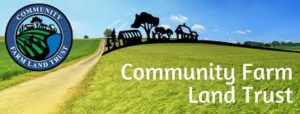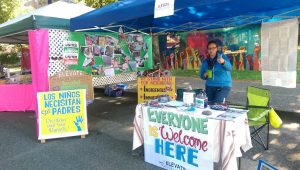We are here for each other
Contributions from local donors allowed Olympia’s Sustaining fund to award generous grants to two projects that address food needs. The Winter Grant Cycle for the Community Sustaining Fund of Thurston County (CSF) was special this year. In addition to funds received through the “Round Up at the Register ‹› program at the Olympia Food Co-op, CFS administered money flowing from the Sue Lundy Fund. The fund was established as a memoriam to Sue Lundy, long-time worker at our local Food Bank and the Kiwanis Club Garden. As a consequence, CSF had more than the usual amount of funds to disburse.
For this cycle, CSF had only two applicants. Although it is not clear why more applications were not forthcoming, one likely culprit is COVID-19. There may be less community action happening during this time of social distancing.
Criteria for distributing the funds aimed first at groups involved in mitigating difficult circumstances caused by the pandemic. Because there were fewer applicants, unlike most prior grant cycles, the CSF was able to award sizable amounts to both groups.
Bowl of Hope—startup campaign
Bowl of Hope (BOH) has, for many months been providing nutritious and delicious hot food for distribution to the most vulnerable in our community— in shelters and outreach centers. Bowl of Hope volunteers believe all people, especially those suffering hardship, deserve the best food we can cook—the same food we serve our family and friends. It is their belief that this can be done regularly and affordably with community support and lots of TLC.
Producing meals for shelters and others unhoused during quarantine
In June of 2020, Interfaith Works approached Linda Mewhirter to provide food for their shelters experiencing the restrictions of quarantine. By July, with some generous financial donations and a network of volunteers, Linda began to produce 300 meals a week, at first from home, but later out of the commercial kitchen at The United Churches of Olympia, where BOH is currently located.
Volunteers and donors ramp up capacity
BOH has since become a non-profit organization. Each week they receive thousands of items from generous local donors. They then purchase packaging required to supply individual meals to the homeless. Linda believes that the group can prepare 500 meals per week, largely based on donations that come via local food banks, GRUB and other local farms.
Becoming a sustainable organization
Their most urgent need at this time is to create a start-up budget to hire staff, purchase materials and acquire additional groceries to round out meals. In order to achieve a sustainable future for this service, they are also looking for funds to cover operating expenses related to running a business, such as outreach materials, business system software, licenses and filing fees.
Linda has been working full-time for BOH as their primary cook and organizer on a volunteer basis. Now in order for the project to continue, she must pay her own bills. Bowl of Hope thus came to the CSF requesting a $1,000 stipend for Linda. Because of the low number of grant applicants, and the special funds available for this grant cycle, CSF was able to add an additional $1000, for a full grant amounting to $2000.
Community Farm Land Trust (CFLT)
Community Farm Land Trust (CFLT) is dedicated to preserving farmland and keeping it farmed forever. They promote local food and farming systems through community-supported farmland preservation strategies, educational outreach and partnerships that increase opportunities for farms and farmers to flourish.
A farm economy based on permanently protected land
They envision productive local farms that provide healthy food for our community and contribute to a vibrant, viable farm economy. They work to permanently protect local farmland and to provide affordable land security for farmers. In this way, they contribute to the support of an agricultural economy that provides for local food security, builds a community that appreciates and supports locally produced food and ensures that farms can continue to provide a good financial return to those who work the land.
An extensive Guide to local farms and their products
The CFLT requested $2,000 toward graphic design and printing of their 2021 farm guide: “Fresh From The Farm: South Sound Farm and Food Resource Guide.” (This was formerly known as the South Sound Farm Map.) This free annual publication lists local farms, farmers, farm products, agricultural and related businesses. The Guide features products, farmers markets, food banks, seasonality guides, farm and farmland statistics and interesting articles from Thurston, Mason, Lewis, and Grays Harbor Counties. In this way, the Guide helps to keep shopping dollars in our region and build our local economy.
Highlighting women and BIPOC farmers
The 2021 Guide will offer photos and articles highlighting the growing number of women and BIPOC farmers in our area. The CFLT sees their stories as vitally important to the future of farming and our community. In a Statement of Solidarity the Guide says:
“As a Farm Land Trust, we are aware that racism, exclusion and displacement have been woven into the history of American agriculture. We know there is structural racism in many of our agricultural institutions and systems. Farming has many challenges; racism and discrimination should not be one of them. We’re continuing our journey and we still have work to do together.”
The Fund was able to award the CFLT the full amount of their request, half coming from CSF funds and half from the Sue Lundy Fund. The Guide will be available electronically through the CFLT website.
Greg Black is part of the leadership team at the Community Sustaining Fund and a local musician.

The Community Farm Land Trust supports farms with educational outreach and partnerships that increase opportunities for the farms and farmers. Your support helped preserve 86 acres of farmland forever, ensuring that it’s affordable and farmed now and by future generations of farmers in the South Sound.
Kirsop Farms (on Thurston County land preserved by the Community Farmland Trust), Harbor Roots Farms in Grays Harbor County, and many more farms in our area not only provide fresh, vibrant, local food for our community but to our food banks too.
Here are some of the things that CFLT accomplished in 2020 with donations and grants from the community:
- Acquired the 29-acre James Family Farm to be preserved and farmed forever
- Expanded the Farm Map into a 68-page free showcase for local food, farms and farmers distributed 10,000 copies throughout the South Sound
- Transformed the annual Farms Forever event into a virtual auction that exceeded its fundraising goal this fall
- Awarded a variety of grants, including work on solar panels at Scatter Creek Farm & Conservancy, presenting an emergency preparedness program for farmers in 2021 and to cover unexpected expenses due to COVID-19. Visit the CFLT website for a full exploration of the many aspects of the organization.

Be First to Comment